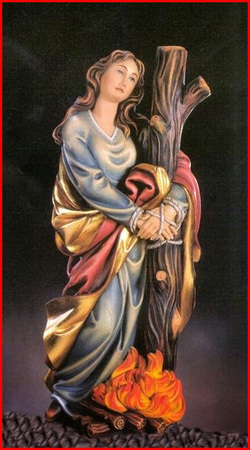| Devotion to Our Lady |
|
- Homepage
-
Daily Thoughts
- 2023 October Daily Thoughts
- Daily Thoughts Lent 2020
- Daily Thoughts for Advent 2019
- Daily Thoughts for October 2019
- Daily Thoughts for September 2019
- Daily Thoughts for August 2019
- Daily Thoughts for July
- Daily Thoughts for June
- Daily Thoughts for Easter 2019
- Daily Thoughts for Lent 2019
- Daily Thoughts for Christmas
- Daily Thoughts Easter 2022
- Sacred Heart
- Holy Ghost
-
Spiritual Life
- Holy Mass Explained
- First Friday Devotions
- First Saturday Devotions
- The Mercy of God
- Vocations
- The Path Everyone Must Walk >
- Gift of Failure
- Halloween or Hell-O-Ween?
- Ignatian Spiritual Exercises >
- Meditation is Soul-Saving
- Spiritual Communion
- Miraculous Medal
- Enrollment in Miraculous Medal
- St. Benedict Medal
- Holy Water
- Advice on Prayer
- Your Daily Mary
-
Prayers
- September Devotions
- Seven Sorrows of Our Lady
-
Novenas
>
- NV-Help of Christians
- NV-Nativity of Our Lady
- NV-Seven Sorrows
- NV- Sorrowful Heart
- NV-Pope St Pius X
- NV-La Salette
- NV-St Michael Archangel
- NV-Immaculate Heart
- NV-Assumption
- NV-Novena for Fathers
- NV-Novena for Your Mother
- NV-St Raphael Archangel
- NV-Souls in Purgatory
- NV-All Saints Day
- NV-Christ the King
- NV-Divine Motherhood
- NV-Guardian Angels
- NV-Rosary
- NV-Mirac Med
- NV- Imm Conc
- NV - Guadalupe
- NV - Nativity of Jesus
- NV-Epiphany
- NV-OL Good Success
- NV-Lourdes
- NV-St Patrick
- NV-St Joseph
- NV-Annunciation
- NV-St Louis de Montfort
- NV-OL Good Counsel
- NV-Last Supper
- NV-Passion
- NV-Pentecost
- NV-Ascension
- NV-Sacred Heart
- NV-Sacred Heart & Perpetual Help
- NV-Corpus Christi
- NV-OL of Perpetual Help
- NV-Queenship BVM
- NV-OL of Mount Carmel
- NV-St Mary Magdalen
- NV- Im Hrt
- August Devotions to IHM
- Immaculate Heart of Mary
- Litany of Dependence
- Prayers to St Mary Magdalen
- Prayers in Times of Sickness Disease & Danger
- Holy Souls in Purgatory
- Meditations on the Litany of Our Lady
- Special Feast Days
- Prayers to Mary (Mon-Sun)
- Litanies to Our Lady >
- Various & Special Needs
- Our Lady of the Rosary
- Our Lady of Mt. Carmel
- Our Lady of Perpetual Help
- Our Lady of Guadalupe
- Other titles of Our Lady
-
Rosary
- Downloads
- Consecration
- Easter Season
-
Holy Week
- Last Seven Words of Jesus >
- Characters of Passion >
- The Last Days of Christ
- Before Palm Sunday
- Palm Sunday
- Monday in Holy Week
- Tuesday in Holy Week
- Wednesday in Holy Week
- Holy Thursday (Last Supper)
- Holy Thursday (Agony & Arrest)
- Night Vigil with Christ
- Good Friday (Pilate & Herod)
- Good Friday (Way of Cross & Crucifixion)
- Saturday in Holy Week
-
Lent
- Ideas for Lent
- Daily Lenten Planner
- Daily Lenten Liturgy
- From Cold to Hot
- Lent with Aquinas
- Lent with Dom Gueranger
- Virtues for Lent
- History of Penance
- How Expensive is Sin?
- Confession of Sins
- Letter to Friends of the Cross
- Sermons for Lent
- Stations of the Cross >
- Lenten Prayers
- 7 Penitential Psalms
- Lenten Psalms SUN
- Lenten Psalms MON
- Lenten Psalms TUE
- Lenten Psalms WED
- Lenten Psalms THU
- Lenten Psalms FRI
- Lenten Psalms SAT
- Lenten Laughs
- Septuagesima
-
Christmas
- Epiphany Explained
- Suggestions for Christmas
- Food For Thought
- Christmas with Aquinas
- Christmas with Dom Gueranger
- Christmas Prayers
- Candles & Candlemas
- Christmas Sermons
- Christmas Prayers SUN
- Christmas Prayers MON
- Christmas Prayers TUE
- Christmas Prayers WED
- Christmas Prayers THU
- Christmas Prayers FRI
- Christmas Prayers SAT
- Twelve Days of Christmas >
-
Advent Journey
- Purgatory
- Christ the King
- Legion of Mary
- Scapular
-
Saints
-
Martyrs for the Faith
>
- Your Daily Martyr >
- All 365 Days of Martyrs
- Cristeros
- St Valentine & Valentine's Day
- Martyrs--Thomas Becket
- Martyrs--John the Apostle
- Holy Machabees
- Age of Martyrdom
- Carmelites of Compiegne
- Martyrs--Peter & Paul
- Martyrs--John the Baptist
- Martyrs--Andrew
- Martyrs--James the Great
- Martyrs--North American
- Martyrs--Seven Holy Sleepers
- Martyrs--Afra
- School of Martyrdom
- Martyrs--Christina
- Desert Saints >
- Saints for Sinners >
- Saints of Mary >
- History of All Saints Day
-
Martyrs for the Faith
>
- Precious Blood
- Synod 2023
-
Catechism
- Catechism Lesson 1
- Catechism Lesson 2
- Catechism Lesson 3
- Catechism Lesson 4
- Catechism Lesson 5
- Catechism Lesson 6
- Catechism Lesson 7
- Catechism Lesson 8
- Catechism Lesson 9
- Catechism Lesson 10
- Catechism Lesson 11
- Catechism Lesson 12
- Catechism Lesson 13
- Catechism Lesson 14
- Catechism Lesson 15
- Catechism Lesson 16
- Catechism Lesson 17
- Catechism Lesson 18
- Catechism Lesson 19
- Catechism Lesson 20
- Catechism Lesson 21
- Catechism Lesson 22
- Bible Study
-
Calendar
- Miracles
- Apparitions
- Shrines
- Prophecies
- Angels Homepage
- Hell
-
Church Crisis
- Conspiracy Theories
- Amazon Synod 2019 >
- Liberalism & Modernism
- Modernism--Encyclical Pascendi
- Modernism & Children
- Modernism--Documents
- The Francis Pages
- Church Enemies on Francis
- Francis Quotes
- Amoris Laetitia Critique
- Danger of Ignorance (Pius X)
- Restore all In Christ (Pius X)
- Catholic Action (Pius X)
- Another TITANIC Disaster?
- The "Errors of Russia"
- CRISIS PRAYERS
- Election Novena 2024
- The Anger Room
- War Zone
- Life of Mary
- Spiritual Gym
- Stupidity
- Coronavirus and Catholicism
- History & Facts
- Books
- Catholic Family
- Children
- Daily Quiz
-
Novena Church & Pope
- Day 01 Church-Pope Novena
- Day 02 Church-Pope Novena
- Day 03 Church-Pope Novena
- Day 04 Church-Pope Novena
- Day 05 Church-Pope Novena
- Day 06 Church-Pope Novena
- Day 07 Church-Pope Novena
- Day 08 Church-Pope Novena
- Day 09 Church-Pope Novena
- Day 10 Church-Pope Novena
- Day 11 Church-Pope Novena
- Day 12 Church-Pope Novena
- Day 13 Church-Pope Novena
- Day 14 Church-Pope Novena
- Day 15 Church-Pope Novena
- Day 16 Church-Pope Novena
- Day 17 Church-Pope Novena
- Day 18 Church-Pope Novena
- Day 19 Church-Pope Novena
- Day 20 Church-Pope Novena
- Day 21 Church-Pope Novena
- Day 22 Church-Pope Novena
- Day 23 Church-Pope Novena
- Day 24 Church-Pope Novena
- Day 25 Church-Pope Novena
- Day 26 Church-Pope Novena
- Day 27 Church-Pope Novena
- Day 28 Church-Pope Novena
- Day 29 Church-Pope Novena
- Day 30 Church-Pope Novena
- Day 31 Church-Pope Novena
- Day 32 Church-Pope Novena
- Day 33 Church-Pope Novena
- Day 34 Church-Pope Novena
- Day 35 Church-Pope Novena
- Day 36 Church-Pope Novena
- Day 37 Church-Pope Novena
- Day 38 Church-Pope Novena
- Day 39 Church-Pope Novena
- Day 40 Church-Pope Novena
- Day 41 Church-Pope Novena
- Day 42 Church-Pope Novena
- Day 43 Church-Pope Novena
- Day 44 Church-Pope Novena
- Day 45 Church-Pope Novena
- Day 46 Church-Pope Novena
- Day 47 Church-Pope Novena
- Day 48 Church-Pope Novena
- Day 49 Church-Pope Novena
- Day 50 Church-Pope Novena
- Day 51 Church-Pope Novena
- Day 52 Church-Pope Novena
- Day 53 Church-Pope Novena
- Day 54 Church-Pope Novena
- Penance Novena
- Daily WeAtheR Forecast
CLICK ON THE NAME OF THE SAINT YOU WISH TO VIEW
(not all links are activated at this time)
THE ROMAN MARTYROLOGY FOR EACH MONTH OF THE YEAR
| January | February | March | April | May | June | July | August | September | October | November | December | All 365 Days on One Page |
MARTYRED SAINTS
| Your Daily Martyr | The Age of Martyrdom (20th & 21st centuries) | The School of Martyrdom | St. Peter the Apostle | St. Paul of Tarsus | St. James the Great |
| St. Andrew | St. John the Baptist | The North American Martyrs | St. Christina | St. Afra | The Seven Holy Sleepers | The Cristeros of Mexico |
SAINTS OF MARY
| St. Louis-Marie de Montfort | St. Dominic | St. John Eudes | St. Maximilian Kolbe | St. Bernard | St. Alphonsus Liguori | St. Ephrem |
| St. Catherine Laboure | St. Bernadette | St. Bridget | St. Catherine of Siena | Pope St. Pius X |
DESERT SAINTS
| Saints of the Desert | St. Paul the Hermit | St. Anthony of Egypt | Desert Father Wisdom |
SAINTS FOR SINNERS
| St. Paul of Tarsus | St. Augustine | St. Mary Magdalen | Dismas the Good Thief |
(not all links are activated at this time)
THE ROMAN MARTYROLOGY FOR EACH MONTH OF THE YEAR
| January | February | March | April | May | June | July | August | September | October | November | December | All 365 Days on One Page |
MARTYRED SAINTS
| Your Daily Martyr | The Age of Martyrdom (20th & 21st centuries) | The School of Martyrdom | St. Peter the Apostle | St. Paul of Tarsus | St. James the Great |
| St. Andrew | St. John the Baptist | The North American Martyrs | St. Christina | St. Afra | The Seven Holy Sleepers | The Cristeros of Mexico |
SAINTS OF MARY
| St. Louis-Marie de Montfort | St. Dominic | St. John Eudes | St. Maximilian Kolbe | St. Bernard | St. Alphonsus Liguori | St. Ephrem |
| St. Catherine Laboure | St. Bernadette | St. Bridget | St. Catherine of Siena | Pope St. Pius X |
DESERT SAINTS
| Saints of the Desert | St. Paul the Hermit | St. Anthony of Egypt | Desert Father Wisdom |
SAINTS FOR SINNERS
| St. Paul of Tarsus | St. Augustine | St. Mary Magdalen | Dismas the Good Thief |
THE MARTYRDOM OF ST. AFRA
feast day August 5th
by St. Alphonsus Liguori (and other sources)
feast day August 5th
by St. Alphonsus Liguori (and other sources)
God will never reject anyone, no matter how bad they are, provided that they wish to leave their sinful ways and turn to God in a spirit of sorrow for sin and a desire for penance to make reparation. It is not for nothing the God says in Holy Scripture: “If your sins be as scarlet, they shall be made as white as snow: and if they be red as crimson, they shall be white as wool” (Isaias 1:18). “Is it my will that a sinner should die, saith the Lord God, and not that he should be converted from his ways, and live?” (Ezechiel 18:23) … “If the wicked do penance for all his sins which he hath committed, and keep all my commandments, and do judgment, and justice, living he shall live, and shall not die. I will not remember all his iniquities that he hath done: in his justice which he hath wrought, he shall live” (Ezechiel 18:23). St. Dismas, the Good Thief on the Cross, converted and accepted the agony and pain of his death throes to see Paradise that very same day: “And Jesus said to him: ‘Amen I say to thee, this day thou shalt be with Me in paradise!’” (Luke 23:43). St. Mary Magdalen was a former prostitute, possessed by seven devils, whom Jesus cast out when she converted. St. Mary of Egypt was also a former prostitute, who became a “Desert Mother” who spent decades of years doing penance in the deserts of Egypt. St. Afra, as we shall see, was of similar mold.
|
The city of Augusta Vindelicorum (the present Augsburg, Germany) was situated in the northern part of the Roman province of Rhætia, on the river Lech, not far from its junction with the river Danube. It was an important Roman colony, invested with municipal rights (municipium) by the Emperor Hadrian, into which Christianity had penetrated even before the time of Constantine, as is proved, beyond question, by the martyrdom of St. Afra.
The history of St. Afra is related by most respectable authors, such as Fleury, Orsi, and Massini. Penitent sinners may receive great encouragement from the consideration of the fortitude communicated to this penitent by the Lord, which enabled her to suffer the martyrdom of fire; and also from the consideration of the wisdom given to her, by which she answered the insidious arguments that were intended to pervert her. In the late 3rd century, Afra and her pagan family journeyed from Cyprus to Augsburg, in Bavaria, Germany. Afra was dedicated to the service of the goddess, Venus, by her mother, Hilaria. According to this source, she was originally a prostitute in Augsburg, having gone there from Cyprus, maybe even as the daughter of the King of Cyprus. She is reputed either to have run a brothel in Augsburg, or worked as a prostitute in the Temple of Venus. As the persecution of Christians during the reign of Roman Emperor Diocletian began, Bishop St. Narcissus of Girona fled from Spain and sought refuge in the Bavarian town of Augsburg. He lodged with Afra and her mother, Hilaria. The triumph of divine grace would bring this most wretched creature, from the very lowest abyss of infamy and shame, to the glory of martyrdom. Through his teachings, it is believed that Bishop St. Narcissus converted Afra, together with her mother and entire family, to Christianity. From the work called the Acts of Afra, found in Ruinart, it would appear that she had always before her eyes the deformity of her crimes, and was tortured by the recollection of them; so that when she had embraced the Faith, she endeavored to get rid of the price of her infamy and shame by giving generously to the poor; and when some Christians, although in extreme poverty, refused to receive from her, what had been the wages of sin, she would beseech of them to accept it, and pray to God for the remission of her grievous offenses. Thus did this holy penitent prepare herself to receive from God that glorious palm which she finally obtained. She continued to hide the bishop from the authorities. During the persecution of Christians, under the Roman Emperor Diocletian, when it was learned that Afra was a Christian, she was arrested and brought before the judge named Gaius, who said to her: “Come now, sacrifice to the gods; it is better to live than to die amid torments.” The saint replied: “The sins which I have committed before I knew the true God are sufficient; wherefore I cannot now do that which thou commandest. I never will do so: it would be adding a new insult to my God.” The judge having ordered her to repair to the temple, she answered with great courage: “My temple is Jesus Christ, whom I have continually before mine eyes, and to whom I every day confess my sins. Since I am unworthy to offer him any other sacrifice, I am anxious to sacrifice myself, in order that this body, with which I have offended him, may be purified by torments; this reflection shall make me suffer most willingly.” “Since, therefore,” said Gaius, “by reason of thy wicked life, thou hast nothing to expect from the God of the Christians, thou hadst better sacrifice to our gods.” The saint replied: “My Lord Jesus Christ has said that He descended from Heaven to save sinners. We read in the Gospel that a sinful woman, having washed His feet with her tears, obtained from Him the forgiveness of all her offenses; and, moreover, that He never rejected sinful creatures, nor publicans; but, on the contrary, condescended to converse and even to eat with them.” The iniquitous judge was not ashamed to counsel her to return to her infamous practices, in order that she might gain the favor of the gallants, and enrich herself. “I renounce,” said the penitent Afra, “that execrable gain, and look upon it with horror. That which I had, I have cast from me and given to the poor, imploring them to accept it; how, then, can I consent to earn it again?” After this the discussion was continued in the following manner: Gaius said: “Thy Christ esteemeth thee unworthy of Him; in vain thou callest Him thy God; He will have nothing to do with thee; a common prostitute cannot be called a Christian.” “True,” replied Afra, “I am unworthy of this name, but my God, Who chooseth not persons according to their merits, but according to His own goodness, hath been pleased to accept me, and make me a participator of His Name.” “And whence knowest thou that He hath done thee this favor?” “I know that God has not cast me off, since He has given me strength to confess His holy Name; and I feel a hope within me that I can thus obtain the pardon of all my sins. “These are foolish stories,” replied the judge; “sacrifice to our gods; because they alone can save thee.” “My salvation,” answered the saint, “depends alone upon Jesus Christ, Who, while hanging on the cross, promised Heaven to a robber that confessed his sins.” “If thou wilt not sacrifice, I shall cause thee to be stripped and whipped publicly, to thy great shame.” “I am ashamed only of my sins,” Afra responded. “And I,” said Gaius, “am ashamed to be losing my time in disputing with thee. Sacrifice to the gods, or I shall condemn thee to death.” “That is what I desire, since I hope thus to find an eternal repose.” Gaius threatened that if she would not sacrifice, he would order her to be tortured and burned alive. The saint courageously replied: “Let this, my body, which hath been the instrument of so many sins, undergo every torment; but let my soul not be contaminated by sacrificing to demons.” The judge then pronounced sentence upon her, in the following words: “We ordain that Afra, a prostitute, who has declared herself to be a Christian, and has refused to sacrifice to the gods, be burned alive.” The place selected for the execution of this terrible sentence was a little island in the river Lech. The saint, having been conducted to this place, and the executioners having tied her to the stake, she raised her eyes to heaven, and prayed after the following manner: “Oh Lord Jesus Christ, Who camest to call, not the just, but sinners to repentance, and Who hast vouchsafed to make known unto us, that, upon whatever day the sinner shall return to Thee by contrition, Thou wilt forget all his offenses; receive me now, a poor sinner that offers herself to suffer this torture for Thy love. By this fire, which is about to burn my body, deliver my soul from everlasting flames.” At the termination of this prayer, fire was set to the pile, and the saint was heard to say, “I give Thee thanks, O Lord, Who, being innocent, didst offer Thyself a sacrifice for sinners; and being the Blessed of God, didst vouchsafe to die for us children of wrath. I give Thee thanks, and offer myself a sacrifice to Thee, Who, with the Father and the Holy Ghost, livest and reignest world without end. Amen.” Having concluded her prayer, Afra expired. Her three servants, Eunomia, Digna, and Eutropia, were standing on the banks of the river witnessing her martyrdom. As they had been partners in her vice of prostitution, they had also imitated her in her conversion, and had been baptized by the holy Bishop St. Narcissus. Knowing that their mistress was now dead, they crossed over to the island; and the news having reached Hilaria, the saint’s mother, she also came, accompanied by some priests; they took the saint’s body and carried it to the family burying-place, two miles distant from Augsburg. Gaius, having been informed of this, sent a troop of soldiers with orders to arrest all who were at the burying-place, and, in case they refused to sacrifice to the gods, to shut them up in the sepulcher, and burn them there. This barbarous order was cruelly executed, and thus all these holy women received the crown of martyrdom in the year 304. |
Web Hosting by Just Host






